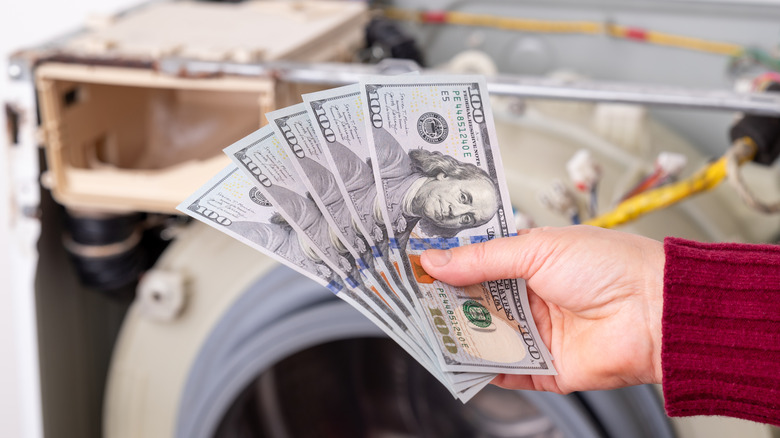You've Been Warned: This Common Home Service Is A Waste Of Money
Many Americans dream of owning a home and for good reason: a house can offer a secure place to live and raise a family, and is also an asset that one can sell later. For some, owning a home can mean you've made it financially. However, homeownership can also come with its fair share of expenses, such as the cost of repairs — from electrical to plumbing to appliances. These systems are essential for a house to run smoothly, which means the expenses tied to them generally can't be postponed. However, as these costs add up, some homeowners might consider the merits of buying a home warranty.
A home warranty is a renewable service that covers the repair costs of a select number of house systems and appliances. Including systems like heating, electrical, and plumbing systems as well as appliances like dishwashers and refrigerators, a home warranty can help control repair or even replacement costs. However, what many people might not realize before purchasing this service is that it comes with loopholes that often limit how the coverage works. For instance, a warranty company may deny a claim on the grounds that an appliance issue resulted from lack of maintenance. These vague terms, usually determined by the warranty company itself, can make a home warranty service one of the many insurance products that are a total waste of money.
Why a home warranty is a waste of money
A home warranty service also costs more than homeowners might expect. Although the amount varies depending on the number of items and/or the size of your property, basic warranties can cost between $350 and $600 per year, according to Home Warranty of America. Plus, a service fee ranging from $50 to $100 can also apply for each individual visit that might be required. If a technician makes several repair trips in a year, your total expenses could easily surpass $1,000. Worse still, it is not uncommon for a contractor to make multiple visits before resolving any single issue.
Even after paying your annual premiums, there is still no guarantee that your warranty will cover necessary repairs. Home warranty exclusions can be particularly frustrating, with some warranty companies denying claims for reasons as trivial, and vague, as appliance misuse, such as using an oven's warming drawer to store food. Faulty installations can void coverage altogether, while system upgrades — such as for energy efficiency — can not only lead to denied claims but are also a home improvement project that can lose you money. This can ultimately leave a homeowner shouldering the cost of repairs, or even replacements, despite having already paid for a warranty.

